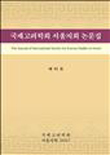한국의 경제위기와 국가-노동관계
Economic Crisis and State-Labor Relations in South Korea
- 국제고려학회 서울지회
- 국제고려학회 서울지회 논문집
- 제1호
-
1999.06503 - 543 (41 pages)
- 28

The foreign-exchange crisis triggered the formation of a cooperative state-labor relations. In February 1998, labor agreed on an earlier implementation of flexible layoffs and legalization of hiring substitute workers, while the state promised to strengthen the social safety net and other measures to cope with employment stability. The cooperative relations, however, was soon challenged. Extensive implementation of the structural reform program led to massive unemployment and a sharp drop in worker’s income, whereas state employment policy was poor and capitalists abused the flexible layoffs. Consequently, the state-labor relations have increasingly become at odds.
1. 서론
2. 분석의 구도
3. 축적의 위기
4. 노사정대타협 : 협력적 국가-노동관계
5. 구조조정의 충격과 노동의 저항 : 갈등적 국가-노동관계
6. 결론 : 이론적ㆍ정책적 함의
참고 문헌
(0)
(0)